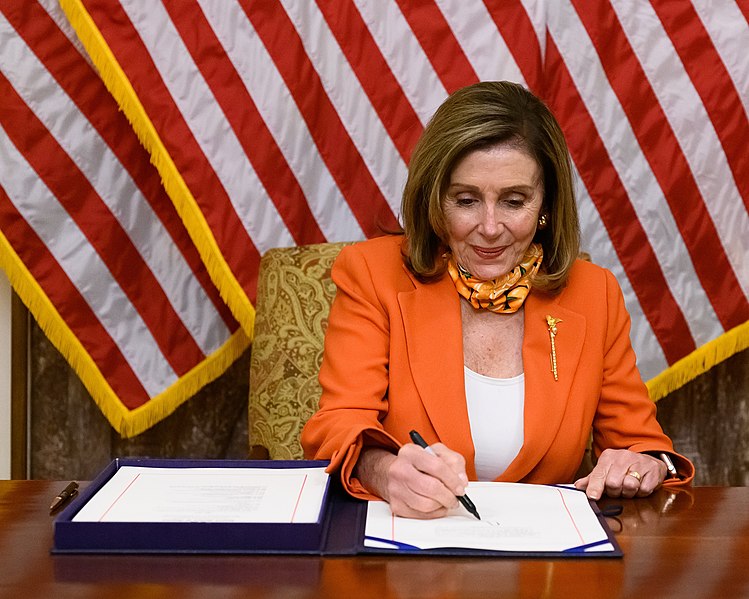Following the recent passage of the $1.2 trillion bipartisan infrastructure package by the Senate, it is now up to the House to vote on the proposal. With the focus now on the Democratic majority in the House, House Speaker Nancy Pelosi now faces pressure from all factions of her party in its passage.
The Hill reports that Pelosi is facing pressure from both moderate Democrats and liberal Democrats regarding the passage of the infrastructure bill. Moderate Democrats are hoping to seize a big bipartisan achievement by voting on the proposal sooner, but liberal Democrats are looking to refrain from making a vote until the Senate passes the $3.5 trillion proposal through reconciliation. Pelosi has previously made her support towards the latter tactic known and has reiterated it since.
Democratic House leadership also made the move of cutting their seven-week recess short, assuming that the Senate passes the proposal this week. House Majority Leader Steny Hoyer said in a letter to his colleagues that the House will be in session on August 23 to take up the vote on the Democratic-led proposal.
While the bipartisan proposal looks to be on track to approval by the House, delaying the move may prove to be a risk as the Senate remains evenly divided and Republican support has proven to be critical. Nevertheless, moderate Democrats are calling on Pelosi to bring the proposal to the floor for a vote immediately shortly after the proposal passed the Senate.
Pelosi praised the passage but noted that it falls short of what US President Joe Biden and the Democrats were hoping for when they made the infrastructure push. Pelosi has then dismissed calls for an immediate vote.
Meanwhile, Pelosi and Senate Majority Leader Chuck Schumer criticized the GOP for threatening not to help raise the debt ceiling this year. Democrats argued that their party should not be the one to shoulder the politically toxic vote, noting that the country raked in debt of almost $7.8 trillion during the Trump administration. Only a small portion of Republicans had opposed the massive tax cuts and government spending during the pandemic, with only the wealthiest households benefiting from the cuts.



 Trump Signs Executive Order Threatening 25% Tariffs on Countries Trading With Iran
Trump Signs Executive Order Threatening 25% Tariffs on Countries Trading With Iran  Trump’s Inflation Claims Clash With Voters’ Cost-of-Living Reality
Trump’s Inflation Claims Clash With Voters’ Cost-of-Living Reality  Israel Approves West Bank Measures Expanding Settler Land Access
Israel Approves West Bank Measures Expanding Settler Land Access  Federal Judge Restores Funding for Gateway Rail Tunnel Project
Federal Judge Restores Funding for Gateway Rail Tunnel Project  Ohio Man Indicted for Alleged Threat Against Vice President JD Vance, Faces Additional Federal Charges
Ohio Man Indicted for Alleged Threat Against Vice President JD Vance, Faces Additional Federal Charges  New York Legalizes Medical Aid in Dying for Terminally Ill Patients
New York Legalizes Medical Aid in Dying for Terminally Ill Patients  U.S.-India Trade Framework Signals Major Shift in Tariffs, Energy, and Supply Chains
U.S.-India Trade Framework Signals Major Shift in Tariffs, Energy, and Supply Chains  Nicaragua Ends Visa-Free Entry for Cubans, Disrupting Key Migration Route to the U.S.
Nicaragua Ends Visa-Free Entry for Cubans, Disrupting Key Migration Route to the U.S.  Ghislaine Maxwell to Invoke Fifth Amendment at House Oversight Committee Deposition
Ghislaine Maxwell to Invoke Fifth Amendment at House Oversight Committee Deposition  Japan Election 2026: Sanae Takaichi Poised for Landslide Win Despite Record Snowfall
Japan Election 2026: Sanae Takaichi Poised for Landslide Win Despite Record Snowfall  U.S. Lawmakers to Review Unredacted Jeffrey Epstein DOJ Files Starting Monday
U.S. Lawmakers to Review Unredacted Jeffrey Epstein DOJ Files Starting Monday  Trump Lifts 25% Tariff on Indian Goods in Strategic U.S.–India Trade and Energy Deal
Trump Lifts 25% Tariff on Indian Goods in Strategic U.S.–India Trade and Energy Deal  Japan’s Prime Minister Sanae Takaichi Secures Historic Election Win, Shaking Markets and Regional Politics
Japan’s Prime Minister Sanae Takaichi Secures Historic Election Win, Shaking Markets and Regional Politics  Trump Congratulates Japan’s First Female Prime Minister Sanae Takaichi After Historic Election Victory
Trump Congratulates Japan’s First Female Prime Minister Sanae Takaichi After Historic Election Victory  Jack Lang Resigns as Head of Arab World Institute Amid Epstein Controversy
Jack Lang Resigns as Head of Arab World Institute Amid Epstein Controversy  Sydney Braces for Pro-Palestine Protests During Israeli President Isaac Herzog’s Visit
Sydney Braces for Pro-Palestine Protests During Israeli President Isaac Herzog’s Visit 































